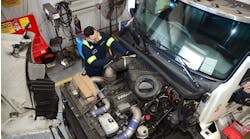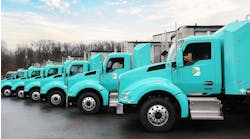Modern-day propane fuel systems inject propane as a liquid through fuel injectors like modern-day gasoline fuel injection systems, related Mario Genovese, director of customer success for ROUSH CleanTech, the clean technology division of Roush Enterprises.
“Liquid propane is held in on-board tanks and then pressurized to the fuel injection system via a fuel pump assembly mounted inside the fuel tank,” Genovese explained. “The liquid propane is injected into the engine’s intake manifold to be atomized with oxygen and burned through the engine’s combustion chamber, exactly how gasoline fuel injection systems work.
“With this fuel injection system, powertrain maintenance intervals and specifications are unchanged from the OEM manufacturers’ recommendations,” Genovese continued. “All engine oil, filter, spark plug, coolant, and transmission fluid maintenance intervals remain the same, and fleets are instructed to follow the vehicle operator’s guidelines for these types of routine maintenance procedures.”
The propane fuel system does contain two fuel filters that are both rated to be changed at 50,000 miles, Genovese pointed out. The first filter is in line between the vehicle’s fuel door/fill valve and the propane tank; the second filter is in line between the vehicle’s fuel tank and the engine’s fuel injection system.
Read more: How advanced fuel technology reduces fuel, M&R costs
“All ROUSH CleanTech propane autogas fuel systems are OBD-II compliant, which means that any automotive diagnostic tool can connect to the vehicle’s port and perform basic diagnostic functions just like a gasoline vehicle,” Genovese said. “This includes reading and clearing diagnostic trouble codes, viewing and recording various engine and fuel system parameters, and performing certain functional diagnostic tests.
“Liquid injection propane autogas fuel systems can provide the same reliability to start and perform in all climates and temperatures,” he continued. “They are also maintained, diagnosed, and repaired in the same fashion as a gasoline fuel system. All of this leads to faster turnaround time for repairs, keeping vehicles on the road and improving uptime for fleets.”
Kitsap Transit, a public transport fleet in Washington, is a longtime ROUSH CleanTech customer and noted the specific benefits of propane versus diesel fuel injectors, as they experienced with their Ford E-450s with a Roush propane conversion.
After more than seven years and 150,000+ miles, they had just begun to swap the propane injectors, Dennis Griffey, Kitsap director of maintenance, told Fleet Maintenance in 2023. This is far less frequent than the buses with Duramax engines.
“They fight over working on the Fords [with propane systems], and people push off working on the GM chassis [with Duramax] as much as they can,” Griffey said.




